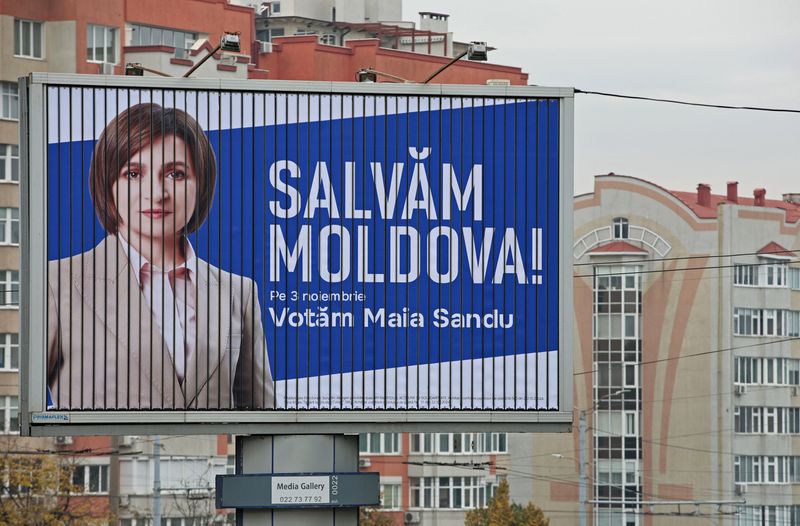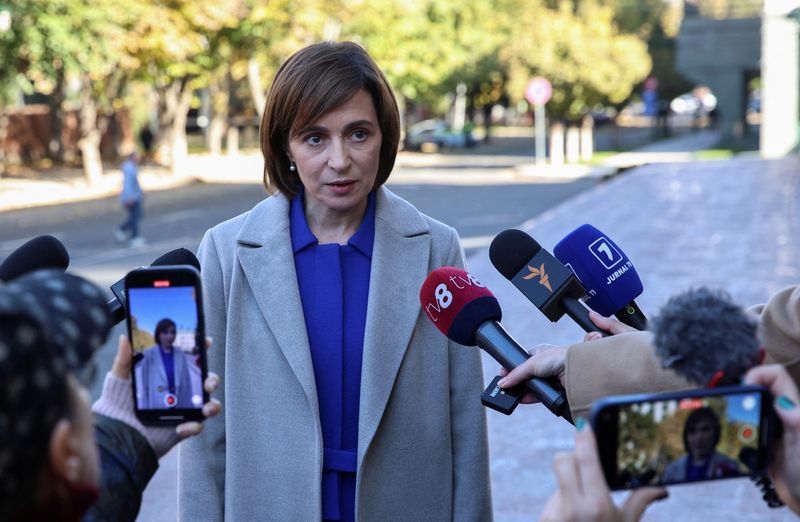By Tom Balmforth
LONDON (Reuters) - Moldova's pro-Western President Maia Sandu faces an uphill struggle to win a second term in an election runoff on Sunday in which her defeat could allow Moscow to gain more influence in a diplomatic battleground between Russia and the European Union.
Sandu, a 52-year-old former World Bank adviser popular in the West, has accelerated the southeastern European nation's push to leave Moscow's orbit, and in June began the long process of EU accession talks as the war in Ukraine raged to the east.
The vote comes after Saturday's parliamentary election in Georgia, another ex-Soviet country trying to join the EU, where a ruling party seen by many in the West as increasingly pro-Russian claimed victory.
"It will be an uphill struggle (for Sandu) with internal grievances, but also external pressure and meddling," said Orysia Lutsevych, deputy director of Chatham House's Russia and Eurasia programme.
She faces Aleksandr Stoianoglo, an ex-prosecutor general backed by the traditionally pro-Russian Socialist Party, who says that, as president, he would back EU integration as well as develop ties with Russia in the national interest.
In last Sunday's presidential debate, Sandu, whose term has seen a sharp deterioration of ties with Moscow, said Stoianoglo was a "Trojan Horse" candidate for outside interests bent on seizing control of Moldova.
The first round of the elections and a referendum held in parallel to gauge the nation's EU aspirations on Oct. 20 were marred by what officials said was a vast vote-buying scheme run by a fugitive, Russian-backed oligarch Ilan Shor.
Sandu has said the scheme sought to pay off 300,000 voters - more than 10% of the population - to vote in a particular way. Moscow has denied any role, while Shor denies any wrongdoing.
Though she said the meddling affected the result, Sandu won the referendum by a close margin, buoyed by votes from the largely pro-European diaspora living abroad. She won 42% at the first round versus Stoianoglo's 26%.
Political analysts said that apart from the interference, the results laid bare genuine opposition to Sandu.
Ruslan Rokhov, a Ukrainian political expert on Moldova and managing partner at the PGR Consulting Group LLC, said the numbers looked stacked against Sandu going into the runoff.
While she and other pro-European politicians won over 650,000 votes in the first round, 850,000 was won by Stoianoglo and candidates who either support Russia or emphasised their independence, he said. Sandu also has a much higher disapproval rating than political newcomer Stoianoglo, he said.
Sandu's term has coincided with a major economic fallout in the poor nation of under 3 million people. That includes the aftermath of COVID and Russia's invasion of neighbouring Ukraine which saw a huge influx of refugees and sharply reduced Russian gas supplies, which in turn caused high inflation.
Radu Burduja, executive director of the Chisinau-based Euro-Atlantic Institute for Building Resilience, said some pro-EU voters also felt that Sandu had "monopolised" the EU agenda for herself, leaving out other pro-EU politicians.
That, coupled with the interference, explained the slim margin of victory at the referendum despite polls showing more than 60% support EU integration, he said.
"The idea with the referendum was that they would use the referendum to increase the numbers for Maia Sandu. What happened actually was the opposite - the anti-rating of PAS (her party) pulled down the referendum."
DEMONSTRATING RESILIENCE
Stoianoglo has advocated a balanced foreign policy that looks both East and West. If he wins, he was likely to be constrained by the PAS party's majority in parliament, though that could change at elections next summer.
"Sandu's defeat at the elections would create good conditions for pro-Russian forces at the upcoming parliamentary elections in 2025," said political analyst Vitaly Andrievsky.
Stoianoglo has pledged to try to negotiate new Russian gas supplies if he takes power and criticised a major EU aid package and Western leaders visiting Chisinau ahead of the Oct. 20 vote as pro-Sandu interference.
He has also mocked the Moldovan government for joining Western sanctions against Moscow as a "circus".
Valeriu Pasha, a Chisinau-based political analyst, said such a position could do harm to Moldova's ties with the EU.
Pasha said it was also vital the second round is "resilient" to interference, as effective meddling could be perceived as a security threat by the EU, leading to members cooling on the idea of its accession.
Asked if they were worried about the geopolitical implications if Sandu loses, a senior diplomat from an eastern EU country in Brussels said: "Yes, but I hope she will win."
"Parliamentary elections in spring will be decisive," the diplomat said.
Asked if there is a real risk of Moldova shifting away from Europe, the diplomat said: "I hope not. The European perspective has the upper hand in Moldova, but Russia will try to derail."

Oazu Nantoi, a lawmaker for Sandu's party, said he remained cautiously optimistic.
"Sometimes a cold shower can be useful."
